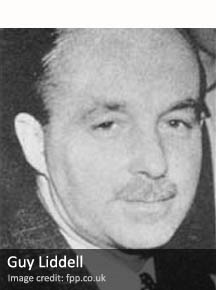MI5 official’s diaries reveal tensions between UK, US spy agencies
October 26, 2012 3 Comments
 By JOSEPH FITSANAKIS | intelNews.org |
By JOSEPH FITSANAKIS | intelNews.org |
Newly declassified personal diaries belonging to a senior British intelligence official reveal tensions between British and American spy agencies in the years immediately following World War II. The National Archives, an executive agency operating under the United Kingdom’s Secretary of State for Justice, released the diaries on Friday. They belong to Guy Maynard Liddell, a longtime British intelligence operative who rose to the post of Deputy Director General of MI5, Britain’s domestic intelligence agency. Liddell meticulously kept a diary during most of the 1940s and 1950s, in which he detailed both personal information and details of his work at MI5. Two volumes of his diaries (from 1939 to 1945, edited by Nigel West) have already been published. Now a third installment has been declassified by the National Archives, containing Liddell’s diary entries from the late 1940s and 1950s. The diaries project what some intelligence historians describe as “a certain friction” between postwar British and American intelligence services. Even though the two countries were largely viewed as allies in the immediate postwar period, their respective intelligence agencies did not always see eye to eye. In one instance, Liddell describes his American colleagues as “utterly incapable […] of seeing anybody’s point of view except their own” and accuses them of being “quite ready to cut off their noses to spite their faces”. He also comes across as skeptical of the then-newly established Central Intelligence Agency, which, he writes, “someday” may be able to produce information that would be “worth disseminating, evaluating, or coordinating”. In 1947, shortly after the CIA’s founding, Liddell wrote with a degree of uncertainty that “in the course of time, [the Agency] may produce something of value”. Further on he relayed the opinion of CIA Deputy Director Edwin Kennedy Wright, who apparently told British intelligence officials that in American intelligence organizations “500 people were employed to do what 50 people would do” in the UK. In an earlier part of his diary, Liddell comes across as dismissive of Federal Bureau of Investigation Director J. Edgar Hoover, whom he describes as “a cross between a political gangster and a prima donna”. The British intelligence official says Hoover routinely resorted to “unscrupulous acts” and would readily undermine British security goals in order to protect the interests of his fiefdom. The diaries also show that Liddell was a staunch and sincere supporter of MI6 intelligence officer and Soviet double spy Guy Burgess. Liddell dismissed rumors that Burgess could be secretly working for the Kremlin almost unlit the day in 1951 when the MI6 spy actually defected to Moscow. Liddell retired from MI5 in 1953, feeling deeply disillusioned following the defection of Burgess and Donald Maclean, both of whom were members of the Cambridge Five Soviet spy ring.







Sounds like Liddell was the epitomy of all that was wrong with British intelligence including his automatically(?) condescending attitude to the CIA and also FBI’s Hoover. These US agencies were probably already more effective than Cambridge Five (http://en.wikipedia.org/wiki/Cambridge_Five) hobbled MI5 and MI6.
Liddell’s stupifyingly unintelligence (for an intelligence person) in supporting Burgess may have been combined with Liddell being in a position of one of several who effectively allowed Philby, Burgess and Maclean to conveniently escape to Russia. After all putting them on trial in Britain may have been even more embarrassing for Liddell and the rest of the British establishment.
Wonder if there are any rules today about intel workers keeping diaries.
It’s alittle ironic that it was none other than Kim Philby that personally assisted the American
s to lay the building blocks –
for what is now the CIA, whilst he was seconded to the U.S. (A scarey scenario when one
could well consider that Philby may have at the time also recruited whithin that organisation
and those actions may well have implications within the U.S & Ottawa to this day. I guess
only Yuri Modin ; Philbys Russian Handler would know. As at 1994 Modin was still nervous
about releasing too much information in his book titled ‘ My five Cambridege friends’)
Green Left Spook is correct in saying that the British had no appetite to prosecute Phliby. Such
revenge would actually have brought the entire British establishment to it’s knees.Such a descision would have been made at a higher level than Liddell’s.
FBI’s – Hoover had a lifelong mistrust of anything resembling British aristocracy +/or the Home
Office. This paranoia in part led to the FBI essentially uncovering of the Cambridge Five.
The most damaging ‘ long term ‘ aspect of this fascinating period of history is that despite all
the volumes written about the affair -” no one person, no author, no investigator on this earth
has ever been able to understand Kim as a person”.
As for Liddel’s diarys revealing tension between the U.S and the U.K – well that’s nothing new. Certainly no more tension than that which exists as a result of the recent Canadian security breach at Trinity House –
by De Lisle – a breach that ; I’m sure ,is everybit as damaging as the Cambridge Five.